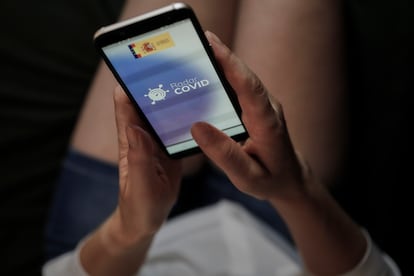Spanish PM calls on ‘all citizens’ to download coronavirus tracking app Radar Covid
With cases of the virus continuing to rise, Pedro Sánchez says the device must be adopted across Spain, highlighting that it could reduce the impact of the pandemic by 30%


Spanish Prime Minister Pedro Sánchez highlighted on Tuesday the importance of the tracking app Radar Covid in curbing the rising number of coronavirus cases in the country.
“Technology can also save lives if it is employed to face a challenge like the one we have before us. That’s why we have promoted the Radar Covid app,” Sánchez said at a press conference.
The information obtained by tracking contacts allows us to understand the level of risk of contagion and warn those affectedSpanish PM Pedro Sánchez
The Socialist Party (PSOE) leader confirmed that the app has already been implemented in the regions of Andalusia, Cantabria, Extremadura, Castilla y León and the Canary and Balearic Islands; and said it urgently needed to be adopted across the rest of the country. The call comes as Spain continues to see a sharp spike in Covid-19 infections, with more than 7,000 reported on Tuesday.
“We urge the remaining regions who have not yet done so to incorporate the digital tracking system,” said Sánchez, adding that “all citizens must download the application.”
Radar Covid has been available to download from app stores for several weeks now. It helps track contacts at risk of contagion by using a cellphone’s bluetooth system. When the handsets of two users are next to each other for at least 15 minutes within a two-meter distance, a file is exchanged via bluetooth that is saved for 14 days. If a person tests positive for Covid-19, the doctor or contact tracer issues them a random alphanumeric number. When the patient introduces this number into the app – which is done voluntarily – all users who have been in close contact with them will receive an alert. The app revises these codes twice a day to check for updates. At no point is the identity of the patient revealed.
“The information obtained by tracking contacts allows us to understand the level of risk of contagion and warn those affected,” explained Sánchez.
Effectiveness
“According to the estimations we have, if more than 20% [of the population] downloads the app, it could reduce the impact of the pandemic by 30%,” said Sánchez.
This assessment, provided previously by the technical advisor of the project, Pablo Rodríguez, is backed by a study from Oxford University that found that, for the app to be most effective, it must be downloaded by 60% of the population, but a lower percentage will also help curb contagion.
According to Sánchez, Radar Covid proved its effectiveness in July during a pilot program in La Gomera in Spain’s Canary Islands. During this pilot, a fictional coronavirus outbreak of 300 cases was simulated in a bid to test the effectiveness of the app. By the end of the experiment, the app had detected 6.4 close contacts at risk of contagion, much higher than the 3.5 contacts identified on average by human contact tracers. “Digital resources are available to the regions and we invite them to use them as soon as possible to benefit all our compatriots,” said Sánchez.
Installation and use
Installing Covid Radar is a simple process. Users need to download the app (Google Play Store for Android cellphones, Apple App Store for iOS cellphones), accept the privacy policy and activate their handset’s bluetooth system.
A person who tests positive for Covid-19 can use the app to anonymously warn close contacts of the risk of infection. They can also check their own level of risk and receive alerts if they have been exposed to the virus.
Other European countries have already introduced their own coronavirus tracking apps. France launched StopCovid in June, and Germany released its device in the middle of that month. In Ireland, 37% of the population has downloaded the country’s tracking app – one of the highest rates in Europe – and in Germany, the figure is 20%.
Other countries, such as Norway and the United Kingdom, have refused to introduce digital tracking systems. In the case of Norway, authorities are concerned about privacy issues and, given the low transmission rates in the country, do not believe the benefits outweigh the potential violations of privacy.
English version by Melissa Kitson.
Tu suscripción se está usando en otro dispositivo
¿Quieres añadir otro usuario a tu suscripción?
Si continúas leyendo en este dispositivo, no se podrá leer en el otro.
FlechaTu suscripción se está usando en otro dispositivo y solo puedes acceder a EL PAÍS desde un dispositivo a la vez.
Si quieres compartir tu cuenta, cambia tu suscripción a la modalidad Premium, así podrás añadir otro usuario. Cada uno accederá con su propia cuenta de email, lo que os permitirá personalizar vuestra experiencia en EL PAÍS.
¿Tienes una suscripción de empresa? Accede aquí para contratar más cuentas.
En el caso de no saber quién está usando tu cuenta, te recomendamos cambiar tu contraseña aquí.
Si decides continuar compartiendo tu cuenta, este mensaje se mostrará en tu dispositivo y en el de la otra persona que está usando tu cuenta de forma indefinida, afectando a tu experiencia de lectura. Puedes consultar aquí los términos y condiciones de la suscripción digital.








































